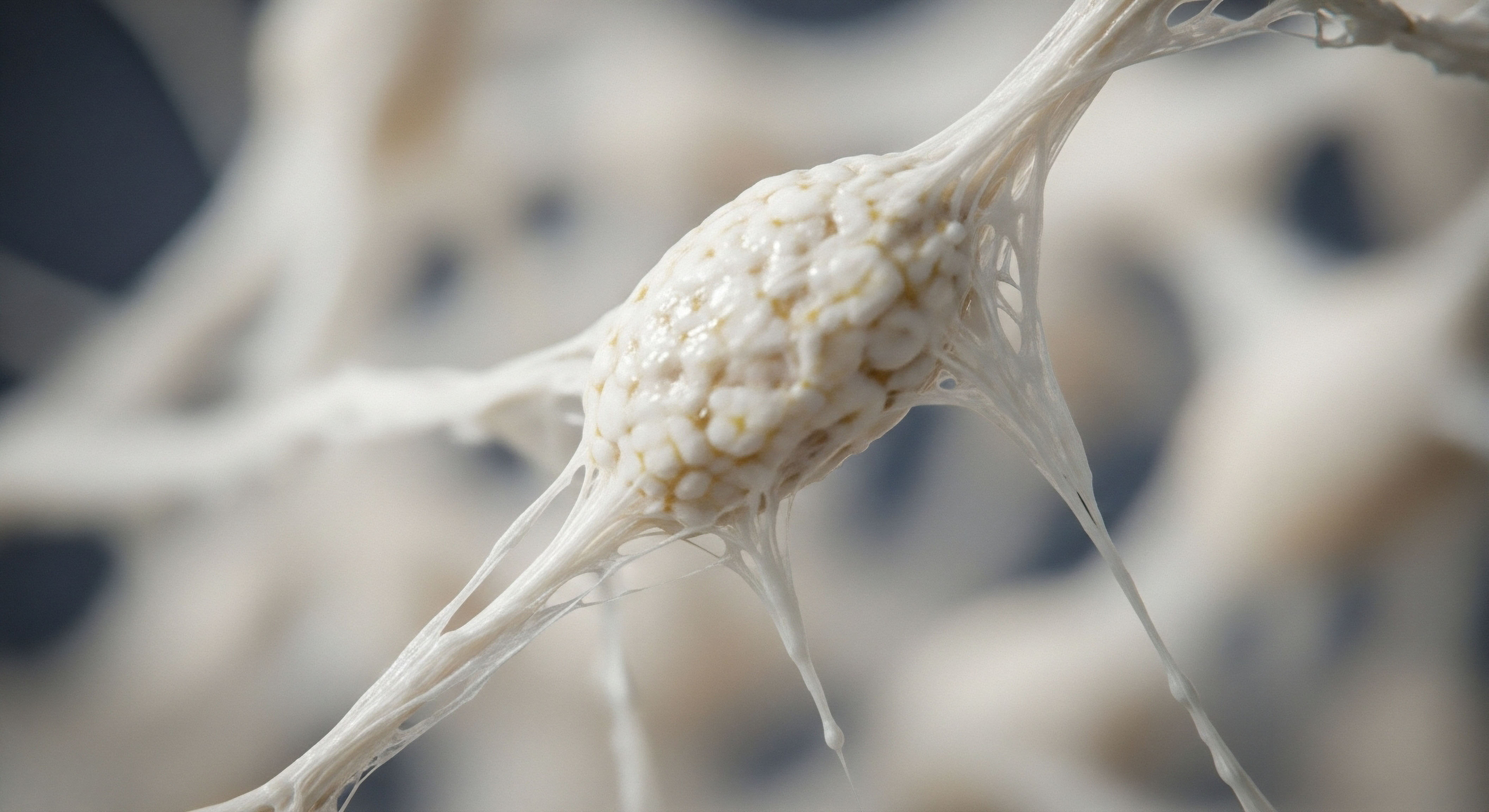

The Command Center’s Silent Architects
Your body operates as a sophisticated biological system, a marvel of interconnected processes orchestrated by a master conductor ∞ your endocrine system. Hormones, the chemical messengers of this system, dictate virtually every aspect of your existence ∞ from your energy levels and mood to your metabolic efficiency and capacity for recovery.
They are the silent architects shaping your physical and cognitive architecture, determining your drive, resilience, and overall vitality. For too long, the conversation around hormonal optimization has been narrowly focused on isolated glands, overlooking a fundamental truth ∞ the profound influence of your gut microbiome on this intricate hormonal symphony.
The gut, far from being a mere digestive conduit, functions as a critical regulatory hub, actively participating in the synthesis, metabolism, and signaling of hormones that govern your well-being. Understanding this connection is not merely academic; it is the cornerstone of unlocking your peak biological potential.
The gut microbiome, a teeming ecosystem of trillions of bacteria, fungi, and viruses, engages in a constant dialogue with your endocrine system. These microbial inhabitants are not passive bystanders; they are active participants in your physiology. They synthesize essential vitamins, produce neurotransmitters that directly impact mood and cognitive function, and metabolize hormones, particularly estrogens, influencing their bioavailability and activity.
When this microbial community is in balance ∞ a state of eubiosis ∞ it supports robust hormone production and efficient signaling pathways. However, when dysbiosis, an imbalance in the gut flora, takes hold, the consequences ripple throughout your body, disrupting hormonal equilibrium.
This disruption manifests in tangible ways. Reduced energy, persistent fatigue, impaired cognitive clarity, mood instability, and compromised body composition are direct indicators of a misfiring endocrine system, often rooted in gut dysregulation.
Systemic inflammation, a common consequence of a compromised gut barrier (“leaky gut”), further exacerbates hormonal imbalances by interfering with hormone receptor sensitivity and disrupting feedback loops within the hypothalamic-pituitary-adrenal (HPA) and hypothalamic-pituitary-gonadal (HPG) axes. The intricate interplay between gut health and hormone function is a foundational principle for anyone seeking to elevate their performance and longevity.
The gut microbiome acts as a crucial endocrine regulator, influencing hormone production, metabolism, and signaling pathways critical for vitality.
Recognizing the gut as a primary influencer of hormonal health shifts the paradigm from merely managing symptoms to proactively engineering optimal biological function. It positions the microbiome as a key lever in the pursuit of sustained energy, sharp cognition, robust physical performance, and an extended healthspan. This understanding is the first step in transforming your biological operating system.


Engineering Your Endocrine Blueprint through Gut Mastery
The transformation of raw biological potential into peak performance hinges on the precise calibration of your endocrine system, a process intrinsically linked to the health and composition of your gut microbiome. This section details the mechanisms through which your gut microbiome orchestrates hormonal function and outlines actionable strategies for its optimization, thereby recalibrating your hormonal blueprint for superior vitality.

The Microbial-Endocrine Nexus
Your gut’s microbial inhabitants are biological chemists, producing a diverse array of metabolites that profoundly influence endocrine signaling. Short-chain fatty acids (SCFAs), such as butyrate, propionate, and acetate, generated from the fermentation of dietary fibers, are potent modulators of metabolic health.
Butyrate, for instance, serves as an energy source for colonocytes, strengthens the gut barrier, and exerts anti-inflammatory effects systemically. These SCFAs can influence insulin sensitivity, appetite regulation via gut hormones like GLP-1, and even impact steroid hormone metabolism.
Furthermore, the gut microbiome plays a significant role in the deconjugation and reabsorption of estrogens in the liver via the enterohepatic circulation. An imbalanced microbiome can lead to altered estrogen metabolism, potentially increasing the risk of hormone-sensitive conditions and contributing to hormonal dysregulation. This highlights the gut’s direct involvement in managing the hormonal milieu that governs reproductive health, mood, and cellular proliferation.

Neurotransmitter Synthesis and Hormonal Harmony
The gut-brain axis is a bidirectional communication highway, and the microbiome is a key player. Gut bacteria are responsible for synthesizing a substantial portion of the body’s neurotransmitters, including serotonin, dopamine, and gamma-aminobutyric acid (GABA).
Serotonin, often termed the “feel-good” neurotransmitter, is synthesized primarily in the gut and influences mood, sleep, and appetite, all of which are tightly regulated by hormonal feedback loops. Disruptions in gut serotonin production can therefore cascade into neuroendocrine dysregulation, affecting the HPA axis and stress response.
This neuroendocrine connection is critical. Stress, perceived by the brain, triggers the release of cortisol from the adrenal glands. Chronic stress, often amplified by gut dysbiosis and inflammation, leads to sustained high cortisol levels, which can suppress reproductive hormones, impair thyroid function, and contribute to metabolic dysfunction. By optimizing gut health, you enhance the production of calming neurotransmitters and reduce inflammatory signals, thereby supporting a balanced HPA axis response and more stable hormonal output.

Strategic Gut Optimization for Hormonal Performance
Recalibrating your endocrine system begins with cultivating a thriving gut microbiome. This involves a multi-pronged approach targeting diet, lifestyle, and targeted supplementation.

Dietary Foundations for Microbial Dominance
The cornerstone of a healthy microbiome is a diet rich in diverse, prebiotic fibers. These fibers serve as the primary fuel source for beneficial gut bacteria, promoting their growth and the production of beneficial metabolites like SCFAs.
- Diverse Fiber Intake: Incorporate a wide array of fruits, vegetables, legumes, and whole grains. Aim for variety in color and type to support a broad spectrum of microbial species. Examples include asparagus, leeks, onions, garlic, chicory root, Jerusalem artichokes, apples, berries, and oats.
- Fermented Foods: Regularly consume fermented foods such as sauerkraut, kimchi, kefir, tempeh, and miso. These foods introduce beneficial live microorganisms (probiotics) and can contribute to a more resilient gut ecosystem.
- Polyphenol-Rich Foods: Berries, dark chocolate, green tea, and olive oil are packed with polyphenols, which act as prebiotics and possess antioxidant properties, further supporting gut health and reducing inflammation.
- Strategic Protein and Fat Sources: Opt for lean proteins and healthy fats from sources like fatty fish (salmon, mackerel), avocados, nuts, and seeds. These provide essential building blocks for hormone synthesis and reduce the inflammatory load associated with processed foods.

Lifestyle Interventions for Endocrine Resilience
Beyond diet, several lifestyle factors significantly impact gut and hormonal health.
- Stress Management: Chronic stress is a potent disruptor of both gut and hormonal balance. Implementing daily stress-reduction techniques such as meditation, deep breathing exercises, yoga, or spending time in nature is paramount.
- Quality Sleep: Aim for 7-9 hours of consistent, high-quality sleep per night. Sleep is a critical period for hormonal repair and regulation, including the release of growth hormone and the resetting of cortisol rhythms.
- Mindful Movement: Regular physical activity enhances gut motility, reduces inflammation, and positively influences hormone levels. A balanced approach incorporating resistance training, cardiovascular exercise, and flexibility work is optimal.

Targeted Nutritional Support
In some cases, targeted supplementation can bridge nutritional gaps and support specific aspects of gut and hormonal health.
- Probiotics and Prebiotics: Specific probiotic strains can help restore microbial balance, while targeted prebiotic fibers can selectively feed beneficial bacteria.
- Omega-3 Fatty Acids: Found in fish oil, these potent anti-inflammatories can help quell systemic inflammation originating from the gut.
- Vitamins and Minerals: Nutrients like Zinc, Magnesium, Selenium, and Vitamin D are co-factors in numerous enzymatic reactions essential for hormone synthesis and signaling.
Optimizing gut microbial diversity and function through targeted dietary and lifestyle interventions directly recalibrates endocrine system efficiency and hormonal balance.


The Tipping Points for Hormonal Recalibration
Understanding the optimal timing and recognizing the critical signals for hormonal recalibration is essential for proactive biological management. The journey toward peak vitality is not a static state but a dynamic process, influenced by life stages, environmental factors, and accumulated physiological stress. Identifying the opportune moments to intervene, supported by precise diagnostics, allows for strategic adjustments that can profoundly impact long-term health and performance.

Recognizing the Signals of Imbalance
Your body provides a continuous stream of data indicating its hormonal status. Dismissing these signals is a disservice to your biological potential. Key indicators that your gut-hormone axis may require attention include ∞

Cognitive and Mood Indicators
Persistent brain fog, diminished focus, memory lapses, or unexplained mood swings such as irritability, anxiety, or a general sense of apathy can signal underlying hormonal discord. These are not simply signs of stress; they are data points indicating potential neuroendocrine disruption, often linked to gut dysregulation impacting neurotransmitter production and inflammatory pathways.

Metabolic and Body Composition Shifts
Unexplained weight gain, particularly around the abdomen, despite consistent diet and exercise, is a hallmark of hormonal imbalance, often involving insulin resistance, cortisol dysregulation, or declining sex hormones. Conversely, unexplained muscle loss or difficulty maintaining lean mass can also point to hormonal deficits.

Energy and Sleep Disturbances
Chronically low energy, fatigue that is not relieved by rest, and disrupted sleep patterns ∞ difficulty falling asleep, staying asleep, or waking unrefreshed ∞ are direct consequences of an imbalanced endocrine system. The circadian rhythm, tightly regulated by hormones like cortisol and melatonin, is profoundly influenced by gut health.

Reproductive and Libido Concerns
Changes in libido, menstrual irregularities in women, erectile dysfunction in men, and fertility issues are often direct manifestations of HPG axis dysfunction, which can be significantly influenced by gut health and systemic inflammation.

Diagnostic Precision for Targeted Intervention
Effective hormonal recalibration requires precise data. Relying on subjective feelings alone is insufficient; objective measurement provides the roadmap for effective intervention.

Biomarker Analysis
Comprehensive biomarker testing is non-negotiable. This includes ∞
- Comprehensive Hormone Panels: Measuring key hormones such as testosterone (total and free), estrogen (estradiol), progesterone, DHEA-S, cortisol (diurnal patterns), thyroid hormones (TSH, Free T3, Free T4), and IGF-1.
- Gut Health Assessment: Advanced stool analysis can reveal the composition of your microbiome, identify pathogens or overgrowths, assess digestive enzyme function, and detect markers of inflammation (e.g. calprotectin, lactoferrin) and gut barrier integrity (e.g. zonulin).
- Metabolic Markers: Blood glucose, HbA1c, lipid profiles, and inflammatory markers like hs-CRP provide critical insights into metabolic health, which is inextricably linked to hormonal function.

Timing of Assessment
The ideal time for assessment depends on individual circumstances, but proactive screening is encouraged, especially for individuals experiencing the aforementioned symptoms. For women, hormonal assessments should ideally be timed relative to their menstrual cycle. Regular annual check-ups that include basic hormone and metabolic panels are a prudent practice for all adults aiming for sustained vitality.

The Timeline of Transformation
Once interventions are implemented, patience and consistent monitoring are key. The timeline for observing significant changes varies based on the extent of imbalance, the comprehensiveness of the protocol, and individual biological responses.
- Weeks 1-4 ∞ Foundational Adjustments: Initial improvements in digestion, energy, and mood may become apparent as dietary changes take effect and inflammation begins to subside.
- Months 1-3 ∞ Systemic Recalibration: More profound shifts in hormonal balance, metabolic markers, and cognitive function typically emerge. Continued adherence to the protocol is critical during this phase.
- Months 3-6+ ∞ Sustained Optimization: Significant improvements in body composition, libido, sleep quality, and overall vitality become noticeable. Ongoing monitoring and fine-tuning of the protocol ensure long-term endocrine resilience.
Hormonal recalibration is an ongoing process of biological engineering, not a one-time fix. By understanding the signals, employing precise diagnostics, and adhering to a well-structured, gut-centric approach, you can master your endocrine system and unlock unprecedented levels of vitality and performance.

Mastering Your Inner Ecosystem for Unrivaled Performance
The gut is not merely a digestive organ; it is a central command center, a microbial metropolis that dictates the symphony of your hormonal landscape. By understanding and actively optimizing this intricate relationship, you move beyond passive existence into a realm of proactive biological mastery.
The insights gleaned from scientific inquiry reveal that true vitality is not an accident of genetics but a deliberate cultivation of your internal ecosystem. When you tune your gut, you tune your hormones, and when you tune your hormones, you unlock your highest potential for energy, cognition, physical prowess, and enduring health.
This is the essence of the Vitality Architect’s philosophy ∞ to view your body as a high-performance system, capable of continuous upgrade and optimization, with the gut microbiome serving as the foundational architecture.
The science is clear ∞ a balanced microbiome supports balanced hormones, which in turn drive optimal function across all physiological domains. This is not about chasing youth but about achieving a state of robust, adaptable vitality that transcends age. It is about building a biological operating system that is resilient, efficient, and capable of supporting your ambitions for decades to come. The journey begins with recognizing the profound influence of your gut and committing to its intelligent stewardship.

Glossary

endocrine system

gut microbiome

vitality

inflammation

gut health

metabolic health

gut-brain axis

neuroendocrine

hpa axis

hormonal recalibration




